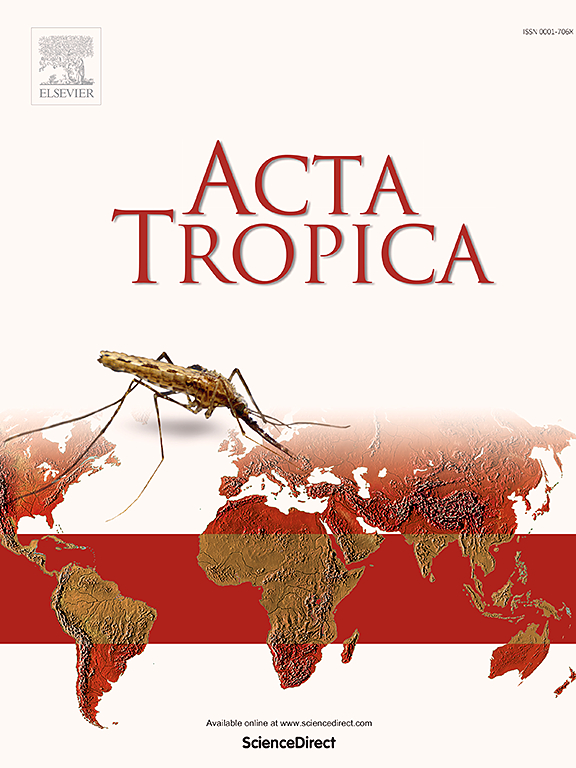IF 2.1
3区 医学
Q2 PARASITOLOGY
引用次数: 0
摘要
克鲁兹锥虫的感染动态是由寄生虫的遗传学以及与宿主和病媒因素的相互作用决定的。该领域的大多数研究都使用不含昆虫粪便成分的轴向寄生虫培养物,而本研究则侧重于在小鼠模型中研究克鲁兹锥虫与蝽粪便相互作用后产生的免疫反应和寄生虫载量。首先,我们利用元基因组学分析了感染和未感染粪便中的微生物群。对 16S rRNA 基因(V3-V4 区域)的 Illumina 测序显示,感染粪便中主要是胂球菌属,未感染粪便中主要是肠球菌属。与单独接种培养衍生的元嗜噬菌体的小鼠相比,接种感染了 T. cruzi 的粪便的 C57BL/6J 小鼠表现出不同的免疫反应,促炎细胞因子(IFN-ɣ、TNF-α)水平较低,而 IL-10 水平较高,表明存在调节反应。此外,各组的总抗 T. cruzi IgG 水平相似,但 T. cruzi 感染粪便组的 IgG1 和 IgG2c 水平降低,表明 Th1/Th2 反应平衡。值得注意的是,小鼠接种受 T. cruzi 感染的粪便后,血液和肌肉中的寄生虫量明显减少,这可能会限制炎症和寄生虫的传播。这些发现凸显了载体粪便微生物群在形成免疫反应和影响自然感染 T. cruzi 期间的疾病结果方面可能发挥的作用。本文章由计算机程序翻译,如有差异,请以英文原文为准。

The interplay between Trypanosoma cruzi and the microbiome of Triatoma infestans: Implications for the host's immune response
The infection dynamics of Trypanosoma cruzi is shaped by the parasite's genetics and interactions with host and vector factors. While most studies in the area use axenic parasite cultures devoid of insect fecal components, this study is focused on the immune response and the parasite loads generated after the interaction of T. cruzi with feces from Triatoma infestans in a murine model. First, using metagenomics, we analyzed the microbiota of infected and uninfected feces. Illumina sequencing of the 16S rRNA gene (V3-V4 region) revealed a predominance of the genus Arsenophonus in infected feces and of Enterococcus in uninfected ones. C57BL/6J mice inoculated with T. cruzi infected feces, displayed distinct immune responses compared to those inoculated with culture-derived metacyclic trypomastigotes alone, with lower levels of pro-inflammatory cytokines (IFN-ɣ, TNF-α) and higher amounts of IL-10, suggesting a regulatory response. Besides, total anti-T. cruzi IgG levels remained similar among groups, but IgG1 and IgG2c were reduced in the T. cruzi infected feces group, indicating a balanced Th1/Th2 response. Notably, mice inoculated with T. cruzi infected feces demonstrated significantly reduced blood and muscle parasite loads, potentially limiting inflammation and parasite dissemination. These findings highlight the possible role of vector fecal microbiota in shaping immune responses and influencing disease outcomes during natural T. cruzi infections.
求助全文
通过发布文献求助,成功后即可免费获取论文全文。
去求助
来源期刊

Acta tropica
医学-寄生虫学
CiteScore
5.40
自引率
11.10%
发文量
383
审稿时长
37 days
期刊介绍:
Acta Tropica, is an international journal on infectious diseases that covers public health sciences and biomedical research with particular emphasis on topics relevant to human and animal health in the tropics and the subtropics.
 求助内容:
求助内容: 应助结果提醒方式:
应助结果提醒方式:


